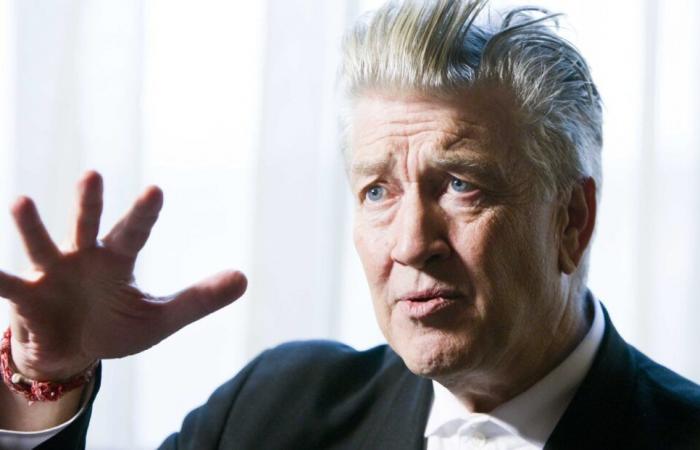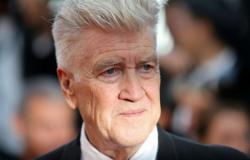Visual artist, director, screenwriter, actor, photographer, musician, designer… and follower of transcendental meditation, the American David Lynch has just passed away at the age of 78. He leaves us a work of incredible richness and depth, which will not fail to further accentuate the siderally empty character of the rest of current contemporary creation…
“It is with deep regret that we, his family, announce the death of the man and artist David Lynch. We would like some privacy right now. There is a big hole in the world now that he is no longer with us. But, as he liked to say, “Keep your eye on the donut and not the hole.” It was through these laconic words that we learned of the death, this Thursday evening, of this immense, fiercely independent and visionary artist, struck by emphysema, a disease leading to the destruction of the pulmonary alveoli.
Director of ten notable and unclassifiable films between 1977 (Eraserhead) et 2006 (Inland Empire), winner of the Cannes Palme d’Or in 1990 (Sailor et Lula), César for best foreign film in 1982 (Elephant Man) et 2000 (Mulholland Drive), Venetian Golden Lion for his entire career (2006) and Honorary Oscar, supreme recognition, in 2019, the shy and reserved little guy from Montana has experienced one of the most beautiful destinies in modern cinema.
Uprooting and painting
How many artists can boast of generating during their lifetime an adjective characterizing a style, a mood, an atmosphere, recognizable among thousands? “Lynchian” (or “Lynchean”) indeed makes it possible to characterize a cultural work managing to transcend the banality of everyday life, the “disturbing strangeness” dear to Doctor Freud, by deliciously cracking the social and familiar veneer of our Western societies while by projecting us into a universe on the borders of the strange, simultaneously dreamlike, surreal, mysterious or nightmarish…
After a youth marked by permanent uprooting in the four corners of his country due to his dad being a biologist at the Ministry of Agriculture, the dreamer David first developed a passion for drawing and the fine arts, which led him to undertake studies in this field with the ambition of meeting his idol, the Austrian expressionist painter Oskar Kokoschka. A connection that unfortunately cannot be made during a hastily organized European trip with his friend Jack Fisk. Back home, the young David Lynch then had the idea of making short films by putting his own paintings in movement and situation with significant work on the post-synchronization sound system. This is how hybrid and unusual materials are born Six Figures Getting Sick, The Alphabet Then The Grandmother, who made him known to critics and especially to investors, willing to grant him a substantial budget for the production of his first feature film in 1977…
First cinematic explosions
With an initial grant of 10,000 dollars (which will ultimately be multiplied by 10 and replenished by the income from small works carried out by the artist himself), David Lynch will take five years to produce a unique, disturbing, unforgettable work, undoubtedly one of the biggest shocks in the history of cinema. In a post-expressionist black and white setting of industrial and urban chaos, Eraserhead plunges us into the sick psyche of an ill-matched couple having just procreated a deformed being akin to a rabbit skinned alive with a long spindly neck… It’s difficult to be more gloomy and sordid… and yet, this experimental film essay is crossed by pure moments of poetry and elegy. The film had an unexpected success in the New York independent circuits on the “Midnight Movies” slots, before being distributed all over the country and was highly appreciated by a certain Mel Brooks who offered Lynch a film project. a much larger scale, Elephant Man, based on the incredible true story of a certain John Merrick, victim of several physical and genetic malformations.
Alternating gothic, grotesque, horrific and melodramatic atmospheres, paying homage to the seminal Freaks by Tod Browning, Lynch, in a state of grace, creates the perfect film. Punctuated by impressive musical tones, sometimes industrial, metallic or melancholic thanks to the brilliant use of the Adagio for strings by Samuel Barber, this story of incredible humanity is also marked by the incredible performance of actor John Hurt in the title role… who, however, missed the Oscar for best actor in favor of Robert De Niro with Raging Bull.
Had the time already come to embark, for only his third film, on one of the most expensive and ambitious productions in history? Namely the challenge of “adapting the unadaptable” with the mythical eco-mystico-politico-philosophical novel Dune by Frank Herbert. Under the cumbersome rule of Dino De Laurentiis, Italian mogul millionaire producer of the project, Lynch does what he can by responding above all to studio directives which are nevertheless very far from his conception of a free and indomitable creator. He will bounce back by regaining a certain independence, again for De Laurentiis, with the formidable Blue Velvet (1986), a strange “neo-noir” thriller contaminated by dark deviant sexual practices, ritualized and fetishized in a fake postcard American suburban town. No one will be able to forget the unusual performance of the actress Isabella Rossellini (Lynch’s future wife), bullied and sadized by a Dennis Hopper who is more drunk and cocaine addicted than ever!
Cannes consecration… and Lynch Mania!
Then came the famous and unexpected Cannes Palme d’Or thanks to Sailor et Lula in 1990, based on the book by Barry Gifford, Wild at Heart: the Story of Sailor and Lula. “It’s exactly what I needed at that moment. The novel and the violence in America merged in my mind and many things emerged. It’s a truly modern love story in an unforgiving world. A film about two people who find love in hell » then reveals Lynch who has the pleasure of finding his muse Laura Dern with whom he will share a great bond until the end of his career. This wild and beautiful film can also be read as a demarcation and a hardcore variation of the iconic Wizard of Oz created by the novelist Lyman Frank Baum in 1900 and first adapted for the cinema by the illustrious Victor Fleming in 1939.
The beginning of the 90s is more than ever synonymous with “Lynch Mania” with the interplanetary launch of a new television series “Twin Peaks»co-written with novelist and screenwriter Mark Frost. An unidentified television object aiming to redefine neither more nor less the codes and archetypes of dusty soap operas. Captivated, Francis Bouygues, construction magnate, owner of TF1 and recent founder of a cinema company (CIBY 2000) then convinced Lynch to produce, against all odds, an adaptation of the series on the big screen. It will therefore be Twin Peaks : Fire Walk With Me, this incandescent fire which gradually consumes the inhabitants of the said town and continues to animate the creative passion of the director with a new muse, the sulphurous Sheryl Lee who will return for the third season of Twin Peaks in 2017 (the very cryptic and cryptic The Return).
-In the meantime, Lynch will return to the convoluted universe of Barry Gifford which suits him so much for its extraordinary Lost Highway (1997), a bad acid trip bordering on madness, directly inspired by the resounding OJ Simpson media trial which shocked and divided America in the mid-90s. “OJ was indeed guilty of the atrocity of the murders he committed, Lynch then concedes. However, he was able to continue to live in freedom, see his friends, play golf peacefully, which is truly amazing! How can this man’s mind react after these horrible crimes? How can the mind protect itself against this memory, the knowledge of these facts that really existed? The functioning of the brain, including its most perverse and pernicious aspects, is fascinating and interests me to the highest degree!”
New masterstroke in 2001 with undoubtedly his magnum opus, Mulholland Drivedirectly financed by its French supporters, the Canal+ group and Alain Sarde. “A love story in the city of dreams”. Drawing inspiration once again from the famous Moebius strip, the director continues his obsession consisting of scraping the veneer of normative and social conventions while taking pleasure in removing the masks of hypocrisies and illusions at the heart of the dream factory and to nightmares called Hollywood. This beautiful metaphorical and labyrinthine poem about the “city of struck down angels” is covered with awards: the direction at Cannes, the César for Best Foreign Film as well as Best Editing at the British BAFTAs. It is also regularly cited by specialized media and film historians as part of the TOP 10 greatest films of all time!
Vertigo and homage
2006, Inland Empirethe end of the cinematographic journey with undoubtedly its most demanding, most abstruse film, the one which will divide the Lynchian community like never before… not to mention professional critics and the general public.
Having reached the top of his art, having nothing left to prove, the director then decides to completely release the forces of his unconscious and to create, freewheeling and without a net, a strange experimental material, disjointed, labyrinthine, as if directly connected at the synapses of a diseased brain. Concept both topographical (the name of a metropolitan area outside Los Angeles) and psychoanalytic (textually, the empire of interiority, this gray and black zone of the depths of the human psyche), this true OFNI (Film Object Unidentified) is especially true for Laura Dern’s mind-blowing performance. A work to undoubtedly rediscover today…
In November 2020, several media reported a series in preparation, designated under the title Wisteriawhich would be written and directed by Lynch, in collaboration with producer Sabrina S. Sutherland and broadcast on Netflix… But nothing will be confirmed after that.
Last surprise… and a big one, Spielberg offers a symbolic and moving role to Lynch in his autobiographical film The Fabelmans in 2022. He plays the legendary director John Ford, privateer’s eye patch, military cap and big cigar, who receives in his office a very young boy (Sammy Fabelman, Spielberg’s double) fascinated by the world of the seventh art and eager for advice from the Master. A beautiful gesture dreaming and displaying an ideal North American lineage, undoubtedly wanting to close the loop of these genius creators. Only History will now be able to judge and pronounce in retrospect on the place that David Lynch will really occupy… somewhere between John Ford, Steven Spielberg and other giants. One thing is certain, he will be greatly missed…






